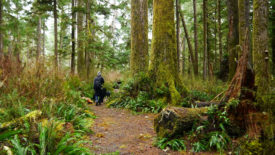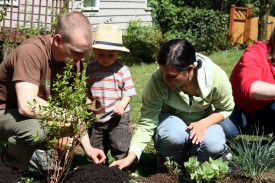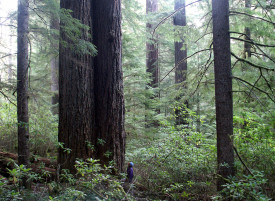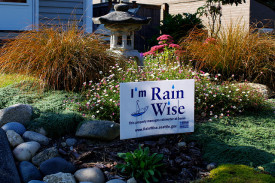Following last week’s release of our new report on stormwater, Lisa appeared on KUOW’s Weekday program this morning—along with David Dicks of the Puget Sound Partnership and Kathy Fletcher from the People for Puget Sound. The segment was on cleaning up the Sound.
Among other things, they discuss the challenges facing the Sound and its marine life, Low-Impact Development, and legislation for a fee on petroleum in Washington state. Here’s a link to the recording.
And for you visually-minded folk, here’s a commercial put out by Puget Sound Starts Here–a well-done, positive explanation of some of things we can do to help clean our waterways.








Matt the Engineer
And don’t forget the fabulous Frontline documentary that Seattle Transit Blog just linked to. The whole 2-hour documentary is definately worth watching, but STB embeded the most relevant section for short-attention-span viewers.
Eric Hess
Thanks, Matt!
Paul Birkeland
I have not listened to the KUOW recording yet, but I watched the commercial. It’s very nice. But it reinforces the view that it’s all the responsibility of individuals to clean things up and keep them clean. Most certainly we all need to work on this. But industry in the form of factories, malls, trucks, and boats is a more than significant contributor to this all. Where are the commercials with that message? Where is the advocate for corporate social responsibility? Puget Sound is not going to be cleaned up just because we all start going to car washes. “Puget Sound is dying. Let’s all take our cars to car washes.” Do you see the disconnect there? Sightline recently posted an article on the psychology of climate denial. It reported that in “Loss and Climate Change,” Rosemary Randall of Cambridge Carbon Footprint said that the size and intractability of the “problem narrative” contrasts with the diminutive steps recommended in most “solutions narratives.” We are leaving ourselves an “out,” a way of denying climate change, with the very solutions we offer. “Hey, if climate change were a serious problem, someone would come up with serious solutions, wouldn’t they?” And since the recommended changes are inconvenient anyway, it’s just easier to deny that we need to do anything, personal or otherwise.I think it’s the same with cleaning up Puget Sound. By implying that we can clean it up by using car washes, we diminish the problem. We need some serious actions.So kudos to everyone getting the message out. But let’s make clear that the real solution is much more far-reaching.
Eric Hess
You’re absolutely right, Paul. Lisa’s extensive work on stormwater often points back to the need for Low Impact Development—pointing to the pressing need to rethink our land use policies as the real solution for stormwater. See our latest report on it.What I do like about the video is that it brings to surface a big problem in the Sound that a lot of folks might not be aware of.
ray benish
I strongly support measures to protect and restore the environmental health of the Puget Sound. However I do tire of the “elites” directing the continuing damage under the guise of being stewards of the environment. David Dicks and the rest of the Puget Sound Partnership board were appointed because they were “safe”; because they were not likely to “rock the boat” and never will we expect them to offer meaningful measures that may crimp profits. City and local jurisdictions have real clout on land use decisions that impact our watersheds and the Sound, so guess what, inadequate setbacks from streams, continued inappropriate development in watersheds, channelization, opposition to LIDs and on and on. Will Dicks call up the mayor of Brier and inquire as to why the City continues to favor property developers with less than 25′ setbacks from streams? The answer is “No”. Mr. Dicks is a go along, get along kinda of guy and that is a key reason for his appointment as with his fellow board members. Mr. Dicks puts the cost of cleanup back to the ordinary folks with calls for dedicated revenues (taxes) but rest assured the local politicans will be free to continue with inappropriate land use decisions adversely impacting the Sound. The Puget Sound Partnership is composed of go along and get along folks, “you kiss me and I’ll kiss you”. The Sound will one day be a dead sea. Then Mr. Dicks will travel on to his next “safe” appointment.